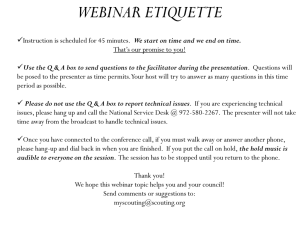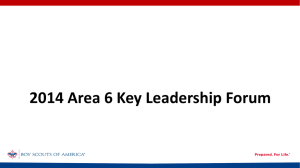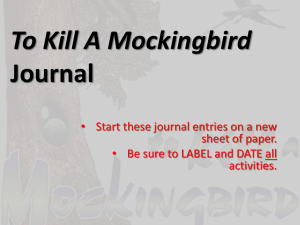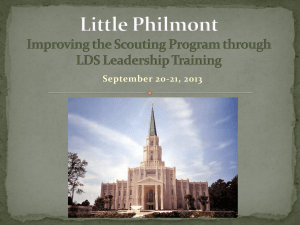Task - Scouts.org.uk - The Scout Association
advertisement
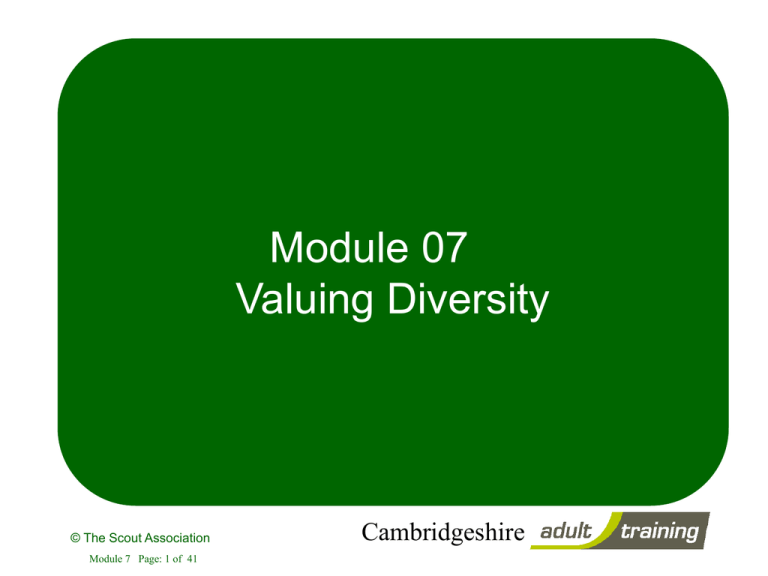
Module 07 Valuing Diversity © The Scout Association Module 7 Page: 1 of 41 Cambridgeshire Module 07 Valuing diversity Aim To promote the policies of the Scout Association that encourage diversity and to consider how individuals, in their roles, can help make Scouting available to all. © The Scout Association Module 7 Page: 2 of 41 Cambridgeshire Module 07 Valuing Diversity Session 1 – A Diverse Community © The Scout Association Module 7 Page: 3 of 41 Cambridgeshire Valuing diversity: Session 1 - A Diverse Community Key Objectives 1 Value cultural, social and religious diversity within communities. 2 Explore the contribution Scouting can make locally in furthering the development of a more inclusive society. © The Scout Association Module 7 Page: 4 of 41 Cambridgeshire Valuing diversity: Session 1 - A Diverse Community Definition of a diverse organisation ‘A diverse organisation is one which values difference. It is one which recognises that people with different backgrounds, skills, attitudes and experiences bring fresh ideas and perceptions. Diverse organisations encourage and harness these differences to make their services relevant and approachable. A diverse organisation draws upon the widest possible range of views and experiences, so it can listen to and meet the changing needs of its users, staff, volunteers, partners and supporters’. National Centre for Volunteering © The Scout Association Module 7 Page: 5 of 41 Cambridgeshire Valuing diversity: Session 1 - A Diverse Community To show that we value something we need to: • Recognise its worth • Know the importance of understanding • Recognise the need to respect differences © The Scout Association Module 7 Page: 6 of 41 Cambridgeshire Valuing diversity: Session 1 - A Diverse Community To value diversity in Scouting we need to: • Respect and value the diversity of the communities in which we operate • Respect and value the individual differences that each person brings to Scouting • Maximise the potential of the young people and adults in Scouting by developing and encouraging the best use of their wide variety of skills and attributes. © The Scout Association Module 7 Page: 7 of 41 Cambridgeshire Valuing diversity: Session 1 - A Diverse Community Task To enable us to start to look at the diverse nature of the communities in which we live, in your groups discuss the following: • In what ways are the communities in which we live diverse? • What positive value can this diversity bring to a community? * You will be required to share some of your ideas in plenary. © The Scout Association Module 7 Page: 8 of 41 Cambridgeshire Valuing diversity: Session 1 - A Diverse Community The purpose of Scouting is to promote the development of young people in achieving their full physical, intellectual, social and spiritual potential as individuals, as responsible citizens and as members of their local, national and international communities. It is important to recognise that Scouting differs across the UK, and across the world. In order to attract young people and to give them the opportunity to develop, we should offer them the Scouting that they want, that meets their needs. © The Scout Association Module 7 Page: 9 of 41 Cambridgeshire Module 07 Valuing Diversity Session 2 – Individuals © The Scout Association Module 7 Page: 10 of 41 Cambridgeshire Valuing diversity : Session 2 - Individuals Key Objectives: 1 State the Scout Association’s policy regarding Coeducation, equal opportunities, Minority Groups and Special Needs. 2 Accept the importance of The Scout Association’s Equal Opportunities Policy. © The Scout Association Module 7 Page: 11 of 41 Cambridgeshire Valuing diversity : Session 2 - Individuals Equal Opportunities Policy a The Scout Association is committed to extending Scouting, its Purpose and Method to all young people in all parts of society. b No young person should receive less favourable treatment on the basis of, nor suffer disadvantage by reason of: • class • ethnic origin, nationality (or statelessness) or race • gender • marital or sexual status • mental or physical ability • political or religious belief. All Members of the Movement should seek to practise that equality, especially in promoting access to Scouting for young people in all parts of society. The Scout Association opposes all forms of racisim. © The Scout Association Module 7 Page: 12 of 41 Cambridgeshire Valuing diversity : Session 2 - Individuals For Young People: • We are committed to extending Scouting, its Purpose and Method to young people in all parts of society. • No young person should receive less favourable treatment nor suffer disadvantage because of any of the six areas stated in the Equal Opportunities Policy. © The Scout Association Module 7 Page: 13 of 41 Cambridgeshire Valuing diversity : Session 2 - Individuals For Adults: • The Scout Association’s values, which underpin and inspire our work with young people, are embodied within the Purpose of The Scout Association and in the Scout Promise and Law. • To carry out its work, adult Leaders and Supporters are needed who are prepared to accept the responsibilities of their commitment. • Members must be ‘fit and proper’ persons to undertake duties of appointed positions and where appropriate, the responsibilities of Membership. © The Scout Association Module 7 Page: 14 of 41 Cambridgeshire Valuing diversity : Session 2 - Individuals Adults need to ensure: • the safety and security of young people • the continued development of young people • equal opportunities for all. The Scout Association’s Equal Opportunities policy was agreed by the Committee of the Council in 1997. When taking on a role in Scouting, all adults agree to abide by this policy. © The Scout Association Module 7 Page: 15 of 41 Cambridgeshire Valuing diversity : Session 2 - Individuals Task In pairs and without speaking, complete Work sheet 1. Once it is complete, discuss whether your assumptions about each other were correct. © The Scout Association Module 7 Page: 16 of 41 Cambridgeshire Valuing diversity : Session 2 - Individuals Task In your groups discuss one of the following options: Option 1 We are all prone to making assumptions about other people. When recruiting adults, what assumptions might we tend to make about them in the following areas: ability, finance, time availability, culture, age, existing skills, family situation, gender, beliefs and values. Option 2 We are all prone to making assumptions about other people. When planning a programme, what assumptions might we tend to make about young people in the following areas: ability, finances, parental background and support, gender, other hobbies, culture - (e.g. food, clothing, social norms, and religion) and at camp? * You will be required to share your lists of assumptions in plenary. © The Scout Association Module 7 Page: 17 of 41 Cambridgeshire Valuing diversity : Session 2 - Individuals Everyone tends to make assumptions about people and situations. Instinctively we judge on the information available to us. What influences our assumptions? • The media • Family • School/College • Peers • Scouting • Work • Our own experiences • Hearsay and gossip © The Scout Association Module 7 Page: 18 of 41 Cambridgeshire Valuing diversity : Session 2 - Individuals We should keep an open mind at all times and only base our judgements on fact not opinion, myth or stereotypes. It is important that we value every Member as an individual, value what they have to offer Scouting and recognise the benefits they bring to others who work with them. It is essential that we remember that as adults/Leaders in Scouting, we are an influence on the young people with whom we work and the assumptions that they might make, as well as the other adults with whom we work. © The Scout Association Module 7 Page: 19 of 41 Cambridgeshire Module 07 Valuing Diversity Session 3 – Facts and Policy © The Scout Association Module 7 Page: 20 of 41 Cambridgeshire Valuing diversity : Session 3 - Facts and Policy Key Objectives State the Scout Association’s Policy regarding Co-education, Equal Opportunities, Minority Groups and Special Needs. 1 2 Explain and value The Scout Association’s Co-education Policy Explain the steps necessary for a Scout Group to be open to both sexes. 3 4 Identify the wide range of Special Needs. Accept that Scouting is open to all young people regardless of their needs. 5 Locate where information, advice and support is available to support Special Needs. 6 Value the cultural, social and religious diversity within communities. 7 © The Scout Association Module 7 Page: 21 of 41 Cambridgeshire Valuing diversity : Session 3 - Facts and Policy A reminder - The six key areas of the Equal Opportunities Policy are: • class • ethnic origin, nationality (or statelessness) or race • gender • marital or sexual status • mental or physical ability • political or religious belief. © The Scout Association Module 7 Page: 22 of 41 Cambridgeshire Valuing diversity : Session 3 - Facts and Policy Task In role specific groups, discuss possible barriers to implementing the Equal Opportunities Policy, and ways to overcome them. Use handout A. © The Scout Association Module 7 Page: 23 of 41 Cambridgeshire Valuing diversity : Session 3 - Facts and Policy Special Needs All of us during the course of our lives experience an impairment of some kind, either permanent or temporary, as a result of an illness, accident or medical condition. Special needs covers a wide spectrum and most leaders will at some time experience working with a young person with a special need. Examples of special needs are: © The Scout Association Module 7 Page: 24 of 41 Cambridgeshire Valuing diversity : Session 3 - Facts and Policy Special Needs can be divided into different categories: • Physical Impairment: This term describes difficulty in moving or using all or part of the body. • Sensory Impairment This indicates that there is a loss of sight or hearing or a loss of one of the senses. • Learning Disability This suggests that a person has difficulty learning in the commonly used and accepted way, or at the same pace as their peers. It does not mean they cannot learn. Often different approaches to learning will help people with a learning disability to understand a concept. • Communication Difficulties Our main forms of communication are by using speech, gesture and the written word. Special Needs may be present as a result of the impairment or one or more of these communication skills. © The Scout Association Module 7 Page: 25 of 41 Cambridgeshire Valuing diversity : Session 3 - Facts and Policy •Mental Illness This includes illnesses that result in disorders of mood, perception, motivation etc. and also conditions that affect the actual brain tissue giving rise to memory loss or disorientation. • Hidden Disability There are a number of conditions that affect the human body which do not produce any outward signs of impairment. Conditions such as heart disease, respiratory disorders and epilepsy may affect the person’s ability to function effectively in particular situations or at certain times. Special needs can be either visible or invisible and often conditions may fall into more than one category, therefore none should be considered in isolation. © The Scout Association Module 7 Page: 26 of 41 Cambridgeshire Valuing diversity : Session 3 - Facts and Policy Scouting Promotes the integration of young people with Special Needs by: • recognising those with Special Needs • accepting them • providing for them through mainstream Scouting and Special Groups • physically integrating them • valuing them © The Scout Association Module 7 Page: 27 of 41 Cambridgeshire Valuing diversity : Session 3 - Facts and Policy We should do our utmost to provide Scouting for those with Special Needs. It must be acknowledged that on occasion, it may not be possible, appropriate, or in the best interests of the young person to join a particular Scout Group. The District Commissioner is responsible for the provision of access to Scouting for a person with Special Needs, therefore if such a decision is made, it must be referred to the District Commissioner. © The Scout Association Module 7 Page: 28 of 41 Cambridgeshire Valuing diversity : Session 3 - Facts and Policy For those working with or considering working with young people with special needs, there is a network of support and resources available: • ADC or Advisor (Special Needs) or District Commissioner • ACC (Special Needs) • The Scout Information Centre • Fact-sheets and Scout Association resources • www.scoutbase.org.uk • Specialised websites for specific disorders or disabilities (for example www.cafamily.org.uk) • Specialised resources for specific disorders or disabilities (for example, Contact A Family Directory) © The Scout Association Module 7 Page: 29 of 41 Cambridgeshire Valuing diversity : Session 3 - Facts and Policy Co-education Policy Task In groups using the resources available, create a prompt card that explains the following: • The key points of the Co-education Policy • The steps that need to be taken to open a Group to both boys and girls. © The Scout Association Module 7 Page: 30 of 41 Cambridgeshire Valuing diversity : Session 3 - Facts and Policy Co-education Policy Task Using Hand out B, discuss how Scouting meets the needs of young people who live within your communities. © The Scout Association Module 7 Page: 31 of 41 Cambridgeshire Module 07 Valuing Diversity Session 4 – Practical Application © The Scout Association Module 7 Page: 32 of 41 Cambridgeshire Valuing diversity : Session 4 - Practical application Key Objectives: 1 Identify how co-education can be built into the Programme 2 Demonstrate a commitment to the implementation of The Scout Association’s Equal Opportunities Policy 3 Explain how Scouting can meet the needs of diverse communities © The Scout Association Module 7 Page: 33 of 41 Cambridgeshire Valuing diversity : Session 4 - Practical application The Equal Opportunities Policy underlines the Scout Association’s commitment to valuing diversity. This is done by extending Scouting to young people in all parts of society. Many difficulties can arise when putting the policy into practice, avoiding fear and misunderstanding by gaining as much information as possible will help overcome these difficulties. There are many resources available to enable you to gain the information required. © The Scout Association Module 7 Page: 34 of 41 Cambridgeshire Valuing diversity : Session 4 - Practical application There are many resources available such as: In Scouting • District and County Support • The Scout Information Centre • www.scoutbase.org.uk Out side Scouting • Websites •Other organisations. © The Scout Association Module 7 Page: 35 of 41 Cambridgeshire Valuing diversity : Session 4 - Practical application It is important to: • Discuss an individual’s needs with them and.or their parents • An individual joins not only a section but also a Group, District and County. Discuss this with all the Leaders in the Group/District as appropriate. • Take care when planning your programme. It is often good to have experimental activities including those that help young people to find out more about diversity, for example inviting guests, visits, awareness raising activities etc. Be aware that you may need to adapt your methods of delivery in order to show respect to other cultures e.g. Visiting a Muslim Mosque. A mixed Scout Group would need to enter in separate groups of males and females. • Make sure that you have suitable and adequate facilities for every member of your group. Remember this is not just at your meeting place but also on camp, and whilst doing outdoor activities, etc. © The Scout Association Module 7 Page: 36 of 41 Cambridgeshire Valuing diversity : Session 4 - Practical application • In the recruitment of and induction of adults, plan an inclusive and supportive programme • Remember to balance the needs of ALL Members • Think creatively and ‘out of the box.’ Just because it has always been done like that doesn’t mean that you cannot try a different way - be flexible • Remember that valuing diversity is not just about what Scouting has to offer individuals. It is also about how Scouting can benefit from their participation • Always use common sense! © The Scout Association Module 7 Page: 37 of 41 Cambridgeshire Valuing diversity : Session 4 - Practical application Task In groups discuss the case study given on the handout. Be prepared to give a short summary of your discussion © The Scout Association Module 7 Page: 38 of 41 Cambridgeshire Module 07 Valuing Diversity Session 5 – Action Plans © The Scout Association Module 7 Page: 39 of 41 Cambridgeshire Valuing diversity : Session 5 - Action Plans Key Objectives • Demonstrate a commitment to the implementation of The Scout Association’s Equal Opportunities Policy © The Scout Association Module 7 Page: 40 of 41 Cambridgeshire Valuing diversity : Session 5 - Action Plans Task Participants should complete worksheet 2, Increasing Diversity, either on your own or working in pairs. We now need to consider how we can encourage diversity within our own Scouting. Task Using work sheet 2, produce a plan to increase the diversity of Scouting in your area. Once completed this task can be used as part of the validation of this module © The Scout Association Module 7 Page: 41 of 41 Cambridgeshire


